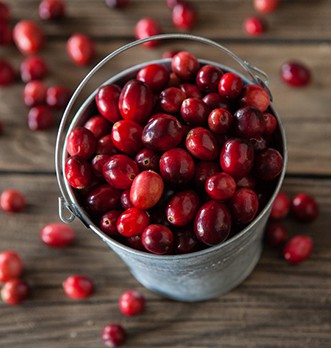
Cranberry herbal tea, with its fruity and slightly tangy flavor, is a very pleasant infusion to drink, but like most fruit teas, it has numerous health benefits, especially for our urinary system.
Cranberry and its legendary virtues
Cranberry (not cramberry) is an evergreen shrub that can live over a hundred years if well cultivated. It is also called large-fruited cranberry (vaccinium macrocarpon). Cranberry is widely consumed in North America, especially during holidays as a sauce accompanying traditional turkey.
Note that there is no difference between cranberry, canneberge, or airelle. These are names used to designate the berries depending on the country (Canada, America, Europe).
Cranberry virtues and properties
The benefits of cranberry are well-known. It is widely used in phytotherapy to prevent and treat various disorders, thanks to its numerous polyphenols (plant antioxidants), which make it a fruit of choice for anyone wanting to maintain good health. It fights against germs and free radicals, responsible for premature cell aging. It is an integral part of a balanced diet.
Cranberry for urinary tract infection
The most well-known virtue of cranberry is its action on our urinary system. It has been the subject of numerous in vitro studies. Its action is simple: preventing bacteria from adhering to the bladder. Thus, drinking cranberry herbal tea has both preventive and curative effects.
Cranberry benefits
Cranberry herbal tea may help prevent periodontal diseases and cavities. Indeed, here too, the plant prevents bacteria from settling, thus protecting gums and teeth.
Caution, this is about prevention. If the bacteria is already established, the use of antibiotics and a visit to the dentist are essential.
In general, cranberry helps maintain a good immune system, fights against cholesterol, protects the stomach (it soothes ulcers) and mucous membranes.
How to use cranberry?
Given its numerous properties, cranberry is widely used by pharmaceutical laboratories.
Thus, one can take cranberry capsules for the prevention of cystitis. Many brands sell these products at affordable prices.
If you don't want to take dietary supplements, you can certainly eat fresh cranberries, but also in other forms that are easily found in our supermarkets.
Cranberry juice benefits
Cranberry juice is very popular, especially for people with recurrent urinary tract infections. Unfortunately, these juices being commercially produced, they are also very sweet, causing the loss of the berry's benefits.
Dried cranberries
Dried cranberry is especially appreciated for its taste and antioxidant properties. However, like the juice, it contains a lot of sugar. Therefore, dried cranberries should be consumed in moderation.
Cranberry herbal tea
Herbal tea has the advantage of suiting all tastes. You can add sugar (we always add less than manufacturers, but prefer "natural" sugar, like honey or stevia), milk... Herbal teas are ideal for benefiting from the virtues of plants and fruits.
Cranberries: benefits or drawbacks?
Even if we take care to choose organic cranberry, excessive consumption may lead to issues such as diarrhea, bloating, and cramps. As for contraindications, people taking anticoagulant treatment should avoid cranberry.
Cranberry during pregnancy
While there is no established link between possible health issues during pregnancy, the opposite is not proven either. In this case, it's better to err on the side of caution and limit cranberry consumption, and seek advice from your doctor.
To benefit from the cranberry benefits, the best way is to consume it as a herbal tea. Without sugar, the plant and berries are even suitable for diabetics and those watching their weight, while still enjoying its properties and the delicate taste and fragrance of the infusion.